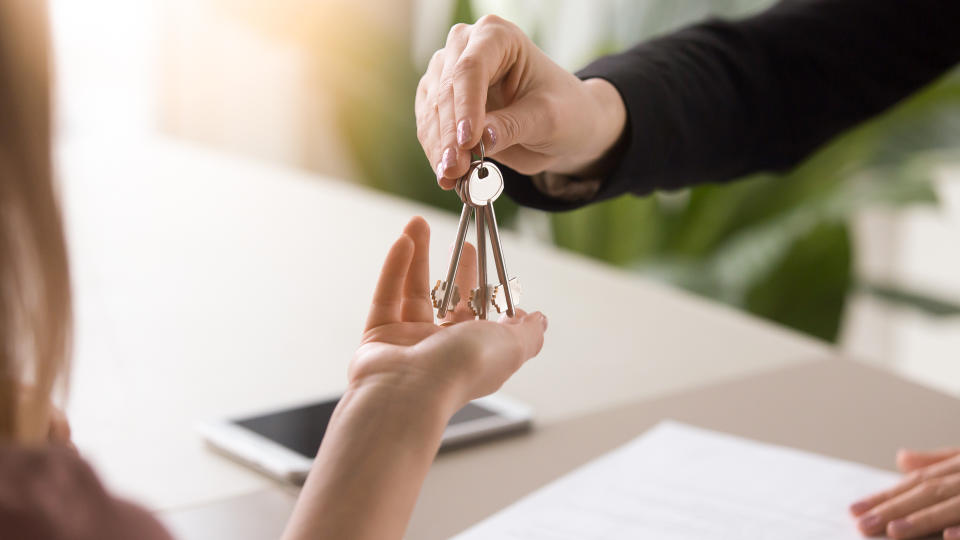5 Common Misconceptions Millennials Have About the Costs of Homeownership

The home buying process can be intimidating and complicated, so it’s not surprising that people who are not currently homeowners don’t fully understand how it works and how much it truly costs. And that certainly seems to be the case for prospective millennial homebuyers in particular.
Read More: 20 Home Renovations That Will Hurt Your Home’s Value
Find Out: 7 Easy Home Renovations for $5,000 or Less
A recent Lombardo Homes survey of more than 1,000 millennials on their attitudes towards homeownership and how well they understand the process found that this generation has a lot to learn about home buying. Here’s a look at some of the commonly held misconceptions millennials have about the costs of homeownership.
Millennials Underestimate How Much Home They Can Afford
The survey asked millennial non-homeowners how much they can afford to pay for a home based on how much they currently pay for rent, assuming a 10% down payment and 4% interest. And it turns out that most millennials are underestimating their buying power. The survey found that on average, millennials underestimated their buying potential by $78,000, and that 1 in 4 millennials underestimated their buying potential by $150,000 or more.
Discover: 6 Ways To Start Building Generational Wealth for Your Family
However, millennials also underestimate how much the average down payment is — the most common response was 7%, when in reality it is 15%.
Although the average down payment is 15%, there are still options for prospective millennial homeowners who want to put less down — though they might not be aware of these options. A separate study conducted by Fannie Mae in 2019 found that 73% of millennials and Gen Z-ers are unaware of lower down-payment mortgage options, which could be a reason why 55% of these generations believe that homeownership is financially out of reach.
Millennials Don’t Understand the Cost of Interest on a Mortgage Loan
While millennials are selling themselves short when it comes to buying power, they also don’t fully comprehend how much interest they could end up paying on a 30-year mortgage loan. The survey asked millennials to estimate how much interest they would pay on a 30-year, $300,000 loan with a 4% interest rate. The average guess was $145,000, when in reality, the answer is $215,000 — 67% more than what they thought they would pay.
Economy Explained: Understanding Interest Rates — How They Affect You and the US Market
Millennials Underestimate How Much Home Values Appreciate
Many of the millennials surveyed don’t know just how much the value of a home can appreciate over time. The survey asked how much a $300,000 home’s value would appreciate over a decade based on the national average appreciation rate of 4% per year. More than half of respondents (62%) underestimated the value increase, with 1 in 4 underestimating the increase in value by $100,000 or more. In reality, a $300,000 home would be worth about $444,000 10 years later based on the 4% appreciation rate — a 48% increase in value.
See: Are We in a Housing Bubble?
Despite this, millennials also didn’t know how long homebuyers should plan to keep a home to make the purchase cost-effective. On average, this takes 13 years, but the average millennial guessed that this would only take five years.
Millennials Don’t Know Much About Property Taxes
Property taxes can play a significant role in the overall cost of a home, yet millennials didn’t seem to know much about these taxes. The majority (78%) didn’t know if the property taxes in their area are high, medium or low. In addition, the most common response when asked for the average property tax percent in the U.S. was 1%, when in reality it’s 14%.
Modern Money Etiquette: Is It OK To Ask Someone How Much They Paid for Their House?
Millennials Believe Renting Is Cheaper Than Buying
Another common misconception held by millennials is that renting is cheaper than buying. A 2019 survey conducted by Freddie Mac found that 82% of renters believe renting is more affordable than owning. However, this usually is not the case. According to Freddie Mac, “even though more than 80% of renters and owners view their housing choice as the most affordable option, the survey finds renters are more likely to be cost-burdened. According to the survey, 34% of renters spend more than one-third of their income on rent, while only 25% of homeowners spend that much on their mortgage.”
More From GOBankingRates
This article originally appeared on GOBankingRates.com: 5 Common Misconceptions Millennials Have About the Costs of Homeownership
